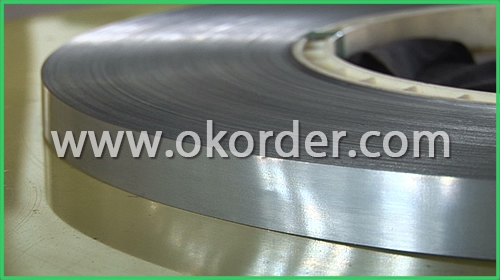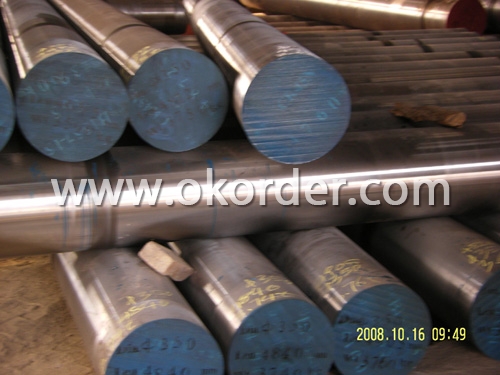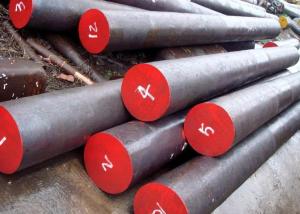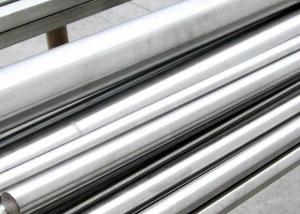Special Steel For Bearing
- Loading Port:
- Guangzhou
- Payment Terms:
- TT or LC
- Min Order Qty:
- 25MT m.t.
- Supply Capability:
- 600000 Tons/Year m.t./month
OKorder Service Pledge
OKorder Financial Service
You Might Also Like
Specifications of Special Steel For Bearing
|
Standard |
AISI, ASTM, BS, DIN, GB, JIS |
|
Dimension |
Diameter: 50mm-500mm Length: 2000-5800mm |
|
Grade |
GCr15, SAE 52100, L3, 1.2067/100Cr6 |
|
Surface treatment |
Black/machined/turned/polished |
|
Technology |
EF/ESR/EAF+VD+LF |
|
Inspection |
100% UT According to En1921D/d |
|
Certificate |
ISO9001: 2008 |
Main Markets: North America, South America, Eastern Europe, Southeast Asia, Africa, Oceania, Mid East, Eastern Asia, Central America, Northern Europe, Southern Europe
Chemical Composition:
China GB, GCr15: C: 0.95-1.05; Si: 0.15-0.35; Mn: 0.25-0.45; Cr: 1.40-1.65
USA AISI, L3: C: 1; Si: 0.50; Mn: 0.25-0.50; Cr: 1.10-1.70
German DIN, 1.2067: C: 0.95-1.10; Si: 0.15-0.35; Mn: 0.25-0.40; Cr: 1.40-1.70
France NF, 100Cr6: C: 0.95-1.10; Si: 0.10-0.35; Mn: 0.20-0.40; Cr: 1.35-1.60
Usage and Applications of Special Steel For Bearing
Wire drawing die/ Heading die
High Quality Bearing steel is used for manufacturing ball, roller bearing steel and rings. Bearing in work is under great pressure and friction, so have high demands bearing steel and hardness and resistance, and high elastic limit.
Bearing steels are used for ball and roller bearing applications and are comprised of low carbon steels and high carbon through harden able steel.
For example, bearing ring, steel rolling mill, machinery, 100Cr6 bearing steel ball is widely used in high-speed and low-noise bearing, bicycle, motorcycle, automobile, bags electronically.
Packaging & Delivery of Special Steel For Bearing
Packaging Detail: Standard seaworthy packing or as customer required.
Delivery Detail: 45 days
Trade terms: FOB, CFR, CIF
MOQ: 25 tons or at customer's demands
Shape of Special Steel For Bearing
Round bar/Flat sheet/steel flat
1. Round: forged steel, rolled steel, drawing steel, polishing steel
2. Abnormal shape: quadrilateral steel, hexagons steel
3. Flat steel



Other Size of Special Steel for Bearing
|
Round |
Diameter |
Length | |
|
50mm-500mm |
2000mm-5800mm | ||
|
Steel plate |
Thickness |
Width |
Length |
|
20-400mm |
80-1000mm |
2000mm-5800mm | |
Characteristics of Special Steel for Bearing
1. High carbon bearing steel
2. High strength and abrasion resistance
3. Low alloy and high fatigue property
4. With strong technical force, better reliability, high quality, competitive price, fast leading time and excellent after-sales service, we have gained a good reputation from our customers.
Quality Assurance of Special Steel for Bearing
We are the ISO 9001:2008 authentication enterprises and we can provide the enterprise's quality written guarantee for all the exported products.
Certificate of quality is issued in English, in addition the normal terms, production process, the mechanical property (yield strength, tensile strength, elongation and hardness. forged ratio, UT test result, Grain size, heat treatment methods and the sample of is shown on the certificate of quality.
Management Certification: ISO 9001:2000, QS-9000, ISO 14001:2004
- Q:How does special steel perform in high-speed machining operations?
- Special steel is specifically designed to perform well in high-speed machining operations. It has unique properties that make it ideal for cutting, drilling, and shaping at high speeds. Firstly, special steel has excellent thermal conductivity, which means it can effectively dissipate heat generated during the machining process. This is crucial in high-speed operations as excessive heat can cause tool wear and deformation. By efficiently transferring heat away from the cutting edge, special steel helps to prolong tool life and maintain dimensional accuracy. Secondly, special steel has high hardness and strength, which allows it to withstand the intense forces and pressures encountered during high-speed machining. This enables it to maintain its shape and integrity, reducing the chances of tool breakage or deformation. Moreover, its high strength also ensures that the machined parts have excellent durability and resistance to wear. In addition, special steel exhibits good machinability, meaning it can be easily cut and shaped with minimal effort. Its composition and microstructure are optimized for efficient chip formation and removal, ensuring smooth operations and reducing the risk of chip clogging or tool jamming. Furthermore, special steel often contains alloying elements such as chromium, molybdenum, and vanadium, which enhance its resistance to corrosion and wear. This is particularly important in high-speed machining operations, where the cutting tools and workpiece are in constant contact. The improved corrosion and wear resistance of special steel contribute to longer tool life and improved surface finish. Overall, special steel is specifically engineered to excel in high-speed machining operations. Its thermal conductivity, hardness, strength, machinability, and resistance to corrosion and wear make it a preferred choice for applications that require fast and precise metal removal.
- Q:How does special steel perform under high-temperature conditions?
- Special steel is specifically designed to perform well under high-temperature conditions. It exhibits excellent resistance to thermal expansion, oxidation, and creep, allowing it to maintain its structural integrity and mechanical properties when exposed to elevated temperatures. The unique composition of special steel, which often includes elements such as chromium, nickel, and molybdenum, contributes to its high-temperature performance. These alloying elements form a protective oxide layer on the surface of the steel, known as passivation, which acts as a barrier against corrosion and further enhances its resistance to high temperatures. Additionally, the microstructure of special steel is carefully controlled through various heat treatment processes, such as quenching and tempering, to achieve optimal toughness and strength even at elevated temperatures. Overall, special steel demonstrates exceptional performance and reliability in high-temperature environments, making it a preferred choice for applications such as power generation, aerospace, and petrochemical industries.
- Q:Can special steel be used for precision instruments?
- Yes, special steel can be used for precision instruments. Special steel, such as tool steel or stainless steel, offers excellent hardness, strength, and corrosion resistance, making it ideal for precision instruments that require high accuracy and durability.
- Q:How does heat-resistant steel perform in high-temperature applications?
- Heat-resistant steel performs exceptionally well in high-temperature applications. It exhibits remarkable strength and stability, allowing it to withstand extreme heat without losing its structural integrity or mechanical properties. This type of steel maintains its resistance to oxidation, corrosion, and creep, making it an ideal choice for various industries such as aerospace, power generation, and petrochemical. Its ability to retain its strength and shape under extreme heat conditions makes it a reliable material for applications where high temperatures are involved.
- Q:Can special steel be used in the production of surgical implants?
- Yes, special steel can be used in the production of surgical implants. Special steel, such as stainless steel, is often preferred for surgical implants due to its high strength, corrosion resistance, and biocompatibility. It is commonly used for various types of implants, including orthopedic, dental, and cardiovascular implants.
- Q:What are the applications of special steel in the oil and gas supply chain?
- Special steel is widely used in the oil and gas supply chain due to its exceptional properties. It is used for various applications such as pipes, valves, and fittings, where its high strength, corrosion resistance, and ability to withstand extreme temperatures and pressures are crucial. Special steel is also used in equipment like drilling tools, offshore platforms, and storage tanks, ensuring reliability and durability in challenging environments. Additionally, it is employed in the construction of pipelines, providing a reliable and safe mode of transportation for oil and gas products.
- Q:What are the main characteristics of high-speed steel?
- High-speed steel (HSS) possesses exceptional properties that make it widely used in machining applications. HSS is characterized by its superior hardness, achieved through the addition of alloying elements such as tungsten, molybdenum, cobalt, vanadium, and chromium. This hardness allows HSS to withstand high temperatures and resist wear. Another notable characteristic of high-speed steel is its excellent heat resistance, enabling it to maintain its hardness and strength even at elevated temperatures. This is crucial in applications where the tool needs to endure high cutting speeds and generate significant amounts of heat. HSS also demonstrates good toughness, resisting cracking and chipping under heavy loads or impact. This ensures the tool's ability to withstand demanding cutting conditions without premature failure. Furthermore, high-speed steel exhibits high wear resistance, making it suitable for cutting, drilling, and milling operations. It retains its sharpness and performance even with prolonged usage, resulting in extended tool life. High-speed steel is highly versatile and can be used for cutting, shaping, and forming various materials such as metals, plastics, and wood. Its versatility makes it a popular choice in industries like manufacturing, automotive, aerospace, and construction. Additionally, HSS can be easily machined and shaped into different tool designs, allowing for customization and optimization based on specific applications. This makes it a preferred material for manufacturing cutting tools like drills, end mills, taps, and saw blades. Compared to other high-performance tool materials like carbide, high-speed steel is relatively more cost-effective. It strikes a balance between performance and affordability, making it a cost-efficient choice for many machining applications. In conclusion, high-speed steel is highly valued for its exceptional hardness, heat resistance, toughness, wear resistance, versatility, ease of machining, and cost-effectiveness. These characteristics make it a preferred material for a wide range of cutting tools, ensuring efficient and reliable machining operations.
- Q:How does special steel contribute to the manufacturing of automotive engine components?
- Special steel plays a crucial role in the manufacturing of automotive engine components by providing enhanced strength, durability, and performance. Due to its unique properties, special steel is used in various critical engine parts, such as crankshafts, camshafts, connecting rods, valve springs, and cylinder heads. One of the primary benefits of special steel in automotive engine components is its exceptional strength. Engine parts made from special steel can withstand high stress, heavy loads, and extreme temperatures without deformation or failure. This strength ensures that the engine operates efficiently and reliably, even under demanding conditions. Moreover, special steel offers superior durability, which is essential for the longevity and performance of engine components. Special steel's resistance to wear, corrosion, and fatigue ensures that the engine parts maintain their functionality over an extended period. This durability translates into increased lifespan and reduced maintenance requirements for the engine, ultimately leading to higher customer satisfaction and lower costs for vehicle owners. The use of special steel in automotive engine components also contributes to improved performance. Special steel allows for the creation of lightweight components, reducing the overall weight of the engine and improving fuel efficiency. Additionally, the high precision and dimensional accuracy achievable with special steel manufacturing processes result in better engine performance, reduced friction, and improved power output. Furthermore, special steel offers excellent machinability, which simplifies the manufacturing process of engine components. Its ability to be easily formed, cut, and shaped enables the production of complex designs and intricate features, leading to enhanced efficiency and performance in the final product. In summary, special steel is vital in the manufacturing of automotive engine components due to its exceptional strength, durability, and performance. Its usage results in engines that are more reliable, efficient, and long-lasting, ultimately contributing to the overall quality and satisfaction of vehicles.
- Q:How is special steel used in the telecommunications industry?
- Special steel is used in the telecommunications industry to manufacture various components and infrastructure. It is primarily utilized in the production of transmission towers, antenna masts, and other supporting structures for telecommunication equipment. The high strength and durability of special steel make it suitable for withstanding extreme weather conditions and providing stability to the telecommunications network. Additionally, special steel is also used in the manufacturing of cables, connectors, and other smaller components that are crucial for efficient signal transmission and communication in the industry.
- Q:How does special steel ensure dimensional stability?
- Dimensional stability is guaranteed by special steel through a variety of mechanisms. To begin with, special steel possesses exceptional strength and toughness, enabling it to withstand external forces and prevent deformation. This characteristic is of utmost importance in applications where precise dimensional accuracy is critical, such as in precision machinery or tooling. Moreover, special steel is subjected to specific heat treatment processes to enhance its dimensional stability. For instance, the common practices of quenching and tempering are employed to augment the steel's hardness and resistance to wear, while simultaneously minimizing the risk of warping or distortion. These treatments also aid in preserving the steel's shape and size over time, even in the face of fluctuating temperature conditions. Additionally, special steel often incorporates alloying elements like chromium, nickel, or molybdenum, which contribute to its corrosion resistance. By preventing oxidation and rusting, these alloying elements assist in maintaining the steel's dimensional stability by averting any deterioration or loss of material due to corrosion. Furthermore, the manufacturing process of special steel adheres to rigorous quality control measures to ensure consistent dimensional accuracy. This encompasses meticulous control of the composition, refining techniques, and casting or forging processes. By maintaining precise tolerances during production, special steel can achieve the requisite dimensional stability demanded by specific applications. In conclusion, special steel secures dimensional stability through its exceptional strength, heat treatment processes, inclusion of alloying elements for corrosion resistance, and stringent quality control during manufacturing. These factors collectively contribute to the preservation of the steel's shape, size, and precision over time.
1. Manufacturer Overview |
|
|---|---|
| Location | Guangdong, China |
| Year Established | 2005 |
| Annual Output Value | Above US$ 100 Million |
| Main Markets | korea, India, Malaysia, Brazil, Germany, Belgium, Middle East |
| Company Certifications | |
2. Manufacturer Certificates |
|
|---|---|
| a) Certification Name | |
| Range | |
| Reference | |
| Validity Period | |
3. Manufacturer Capability |
|
|---|---|
| a)Trade Capacity | |
| Nearest Port | Guangzhou |
| Export Percentage | 50%-80% |
| No.of Employees in Trade Department | 21-100 People |
| Language Spoken: | English; Chinese |
| b)Factory Information | |
| Factory Size: | 23,000 square meters |
| No. of Production Lines | 1 |
| Contract Manufacturing | OEM servise offered |
| Product Price Range | high; average |
Send your message to us
Special Steel For Bearing
- Loading Port:
- Guangzhou
- Payment Terms:
- TT or LC
- Min Order Qty:
- 25MT m.t.
- Supply Capability:
- 600000 Tons/Year m.t./month
OKorder Service Pledge
OKorder Financial Service
Similar products
New products
Hot products
Related keywords




























